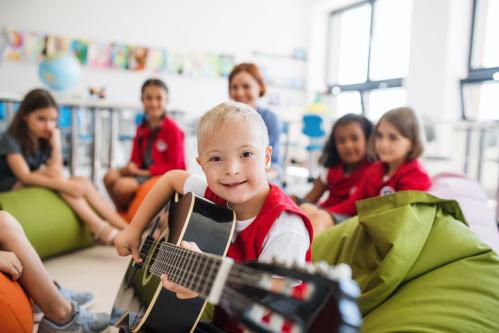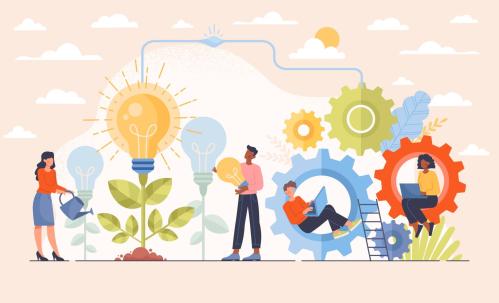As the global trend of schoolification pushes educational systems toward standardization, which emphasizes “preparation for school rather than preparation for life,” innovative approaches that address the how’s, what’s, and why’s of education are critically needed. This prevailing shift, intensifying in the late 90s, often sidelines essential skills like creativity, collaboration, and critical thinking, that are crucial for equipping young learners to tackle global challenges. It also overlooks learners’ well-being and joy—a rising concern in educational circles.
A number of organizations and projects are working to combat the schoolification trend. UNESCO’s Happy Schools initiative hopes to tackle the problem by creating safe, developmentally appropriate, and joyful learning experiences that span multiple learning goals. The OECD’s Future of Education and Skills Project launched in 2019 focuses on how the science of learning can foster best practices for developing holistic education systems that balance academic skills with emotional, social, and practical competencies essential for the 21st century. Further, a number of countries are beginning to address curricular and pedagogical quality through policy initiatives, such as those in Ghana, Vietnam, Singapore, and India, to name a few.
As countries and organizations develop new ways to support U.N. Sustainable Development Goal (SDG) 4, one program from the Global South emerges as a critical response to these issues. In this blog, we explore how methodologies like those developed by Education for Sharing (E4S) champion playful learning and prepare our youth not just for academic success but as proactive, informed global citizens.
The current state of the field
Traditional education systems worldwide have long been characterized by a focus on rote memorization, standardized testing, and a narrow definition of academic success. This approach often results in disengaged learners who lack critical thinking, creativity, and the ability to collaborate effectively. Moreover, traditional education frequently neglects the emotional and social development of students, contributing to a rise in mental health issues and decreased overall well-being.
In contrast, recent educational research emphasizes the importance of holistic development, where cognitive skills are balanced with social, emotional, and practical competencies. Playful learning, a well-established pedagogical approach, is recognized for its potential to engage students, foster creativity, and develop critical life skills. However, integrating playful learning into formal education systems remains a challenge due to systemic resistance, lack of training, and insufficient resources.
How Education for Sharing (E4S) enhances learning through play
In response to calls to transform education systems to address a growing crisis of student engagement in schools, Education for Sharing (E4S) was founded in 2007 and developed a unique framework for learning defined by three core components: play, reflect, act. E4S’s mission is to cultivate global citizens by training teachers in global competencies and translating the SDGs into engaging, hands-on playful experiences for learners. In its first 17 years, E4S has worked with 1.8 million participants from underserved communities around the world, in 13 countries including Mexico, Argentina, Guatemala, Ecuador, and the United States.
E4S stands out in its approach by incorporating playful learning, as it structures its methods around the SDGs to create relevant and timely local and global awareness. Its methodology encourages teachers to not just play for play’s sake, but to leverage play to craft meaningful and actionable learning experiences that emphasize civic values, social-emotional skills, and local applications of global challenges, inspiring learners to become agents of change. E4S’s training and curriculum emphasize clear learning goals within playful learning, reconnecting teachers and students with their agency to achieve these objectives effectively.
Though specifics of the E4S methodology vary and adapt based on the community and context, the structure of its learning experiences are weaved through the three components:
- Play: First, learners participate in playful exercises that illuminate global challenges while enhancing their cognitive, physical, social, and emotional development.
- Reflect: In the second step, learners reflect on these games and activities and discuss their feelings and perspectives about the importance of addressing global challenges. They engage in dialogue with their peers and develop critical thinking skills as they connect global challenges to their local contexts.
- Act: Finally, learners create and implement action plans where they apply the lessons from the program in their community. This supports young people in finding the power to become change makers and innovators capable of working as a team to create local solutions to global problems.
Teachers that use the E4S methodology report improved student engagement and reflective capacities, while learners exhibit increased awareness and knowledge of the global and local challenges associated with the SDGs. For instance, in 2022, surveys from the Sports for Sharing program by E4S in Chihuahua, Mexico1, revealed compelling results: 84% of participating teachers observed a significant surge in student interest toward understanding both global and local challenges linked to the SDGs. This increase in engagement underscores the effectiveness of integrating playful learning into the curriculum, which not only fosters critical thinking but also encourages active participation among learners.
The E4S methodology has also proven to be valuable in promoting the practice of values for the creation of peaceful learning environments. In an internal evaluation conducted in 2020 and 2021, values such as fair play, responsibility, and teamwork saw an average increase of 23, 25, and 15 percentage points respectively among children participating in the projects implemented by the organization throughout Latin America.2
By promoting holistic well-being and cultivating a wide range of cognitive, social, emotional, physical, creative, and imaginative skills, this approach empowers learners to explore their own agency and actively engage with their communities. So far, participating children and youth have implemented thousands of community initiatives through E4S interventions. A few examples include staging plays to promote gender equality, organizing waste separation campaigns, hosting radio programs to raise awareness about the SDGs, and composing rap songs against violence.
Bringing playful learning into policy
Beyond working in individual classrooms, E4S has worked on a systems level to ensure a shift in policies, working toward integration of play-based learning via legislative support. In Mexico, initiatives led by E4S in collaboration with the Mexican government, such as the “Learning Through Play Sustainable Development Goals Workbook,” have successfully promoted global citizenship and reached every sixth-grader nationwide. Another notable project, the “Evolution and Play” accreditation—also a collaboration between E4S, the LEGO Foundation, and the Mexican Ministry of Education—has advanced the use of cooperative, active play-based learning methods for teaching socioemotional skills.
E4S has also been committed to supporting the integration of learning through play into the educational frameworks of out-of-school providers, so that caregivers, educators, and children are surrounded by effective, joyful learning everywhere they go. In a model project in partnership with civic ecosystem builder The History Co:Lab and the LEGO Foundation, E4S showcased the power of play in museums to bring even the most complex historical and social issues to life for young children.
In today’s rapidly changing, polarized, and often scary world, young people are craving a sense of belonging, connection, purpose, hope, and agency. However, most school systems worldwide are focused on metrics that do not support these outcomes. This misalignment coincides with a rise in mental health issues, increased stress, and lower levels of happiness, highlighting the importance of reorienting education systems to deliver learning that is joyful, iterative, socially interactive, engaging, and meaningful. E4S offers a clear example from the Global South of how implementation of joyful learning can support children, educators and families to grow global citizens, to prepare them for life -not just for school.
Key strategies and transferable lessons
To provide broader value to others working in this space, this is an outline of key strategies E4S employs, and the lessons learned from its implementation:
- Integration of Playful Learning with Curriculum Goals: E4S ensures that playful activities are closely tied to curriculum goals, making them relevant to students’ academic and social-emotional development. This alignment helps maintain educational rigor while fostering engagement and joy in learning. Lesson: Align playful learning with clear academic and social goals.
- Teacher training and support: E4S invests significantly in training teachers to implement its methodologies effectively. This includes workshops, continuous professional development, and a supportive community of practice. Lesson: Continuous training and support for teachers are crucial for their motivation and successful implementation of innovative educational approaches.
- Community and context sensitivity: E4S tailors its approach based on the specific needs and contexts of the communities it serves. This sensitivity ensures that the programs are culturally relevant and impactful. Lesson: Adapt educational methodologies to fit the local context and culture to enhance relevance, meaning, and effectiveness.
- Measurement and Evaluation: E4S rigorously measures the impact of its programs through surveys, feedback, and evaluations. This data-driven approach allows for continuous improvement and demonstrates the effectiveness of the programs. Lesson: Implement robust measurement and evaluation mechanisms to continuously improve and validate the impact of educational interventions.
- Collaborative partnerships: E4S works with various stakeholders, including governments, NGOs and private sector partners, to scale its impact and integrate playful learning into broader educational policies. Lesson: Foster collaborative partnerships to scale impact and integrate innovative practices into systems educational policies.
Challenges and insights
Implementing transformative approaches comes with challenges. A few that E4S has faced are obstacles such as resistance to change, limited resources, and the need for continuous advocacy to sustain playful learning initiatives. However, these challenges have also provided valuable insights:
- Overcoming resistance to change: building trust and demonstrating the effectiveness of playful learning through pilot programs and evidence-based results can help overcome resistance from educators and policy makers.
- Resource mobilization: Diversifying funding sources and leveraging partnerships can mitigate resource constraints and ensure sustainability and scale.
- Advocacy and Awareness: Continuous advocacy and raising awareness about the benefits of playful learning are essential to gaining and maintaining trust and support from stakeholders.
By sharing these strategies, lessons, and insights, we hope to provide a blueprint for others working to transform education systems.
As policymakers and educators continue to navigate mental health, stress, and student engagement challenges, leveraging the creative methods being tested and proven by innovators like E4S to craft regional alliances for play is an essential and doable step toward providing not only young people, but also the adults who surround them, with the joy and hope they need to learn and thrive.
The Brookings Institution is a nonprofit organization based in Washington, D.C. Our mission is to conduct in-depth, nonpartisan research to improve policy and governance at local, national, and global levels. The conclusions and recommendations of any Brookings publication are solely those of its author(s), and do not reflect the views or policies of the Institution, its management, its other scholars, or the funders mentioned below.
The LEGO Foundation is a donor to the Brookings Institution and Temple University’s Learning Through Play: Reimagining PreK to Grade 4 Education. Brookings recognizes that the value it provides is in the absolute commitment to quality, independence, and impact. The findings, interpretations, and conclusions in this report are not influenced by any donation.
-
Footnotes
- Peña, M.J. (2022). Evaluation Report on the Implementation of the Sports for Sharing Program in Chihuahua for the Chihuahuan Business Foundation [Unpublished report]. Education for Sharing.
- Peña, M.J. (2022). Summary of Average Results of the Education for Sharing Programs in 2020 and 2021 [Unpublished report]. Education for Sharing.




Commentary
Active playful learning in the Global South
Lessons from Education for Sharing (E4S)
July 18, 2024